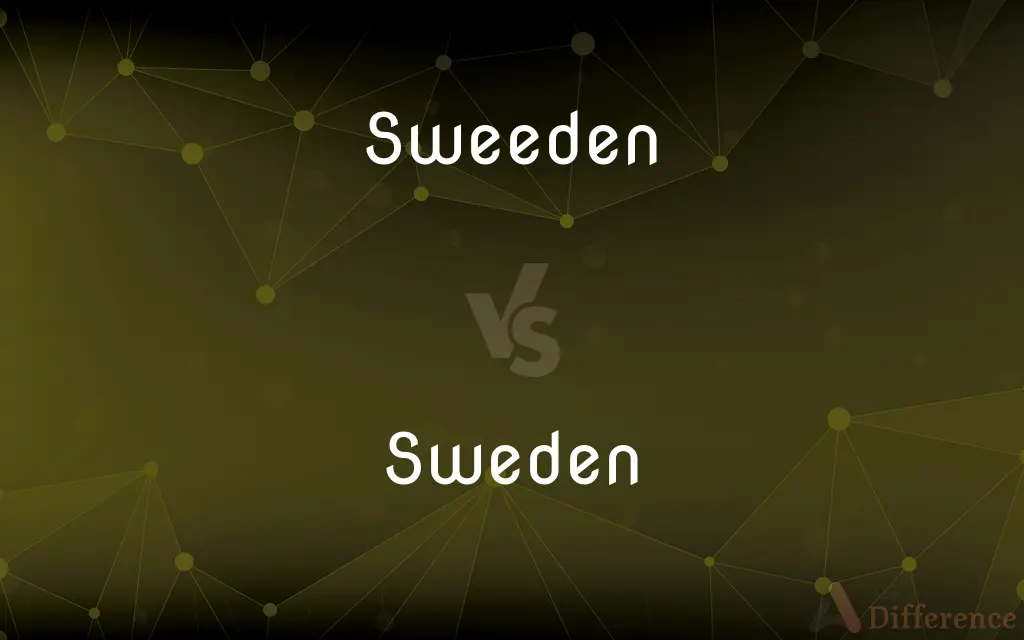Sweeden vs. Sweden — Which is Correct Spelling?
Edited by Tayyaba Rehman — By Fiza Rafique — Updated on April 3, 2024
"Sweeden" is an incorrect spelling. The correct term is "Sweden," a Nordic country located in Northern Europe.

Table of Contents
Which is correct: Sweeden or Sweden
How to spell Sweden?

Sweeden
Incorrect Spelling

Sweden
Correct Spelling
ADVERTISEMENT
Key Differences
Remember that Sweden has just one "e" before the "d."
Note that "Sweeden" sounds like "weeding," which is unrelated.
Associate Sweden with its capital, Stockholm, to remember the proper spelling.
Think of "we" as in "we go to Sweden" to recall the correct sequence of vowels.
Recall popular Swedish brands or icons, such as IKEA or ABBA, to strengthen memory of the correct spelling.
ADVERTISEMENT
How Do You Spell Sweden Correctly?
Incorrect: He is planning a trip to Sweeden next summer.
Correct: He is planning a trip to Sweden next summer.
Incorrect: The capital of Sweeden is Stockholm.
Correct: The capital of Sweden is Stockholm.
Incorrect: Sweeden has a population of about 10 million people.
Correct: Sweden has a population of about 10 million people.
Incorrect: She has relatives in Sweeden she visits every few years.
Correct: She has relatives in Sweden she visits every few years.
Incorrect: Sweeden is known for its beautiful landscapes and cold climate.
Correct: Sweden is known for its beautiful landscapes and cold climate.
Sweden Definitions
A Nordic country in Northern Europe.
She visited Sweden last summer.
A nation with a rich history of Vikings and seafaring.
Sweden's Viking history is a popular tourist attraction.
Home to the Nobel Prize and other cultural contributions.
The Nobel Prize ceremony is held annually in Sweden.
A constitutional monarchy known for its high standard of living.
Sweden is renowned for its welfare system.
A member of the European Union with a strong emphasis on neutrality.
Sweden maintained neutrality during both World Wars.
A Scandinavian kingdom in the eastern part of the Scandinavian Peninsula
Sweden Meaning in a Sentence
The official language of Sweden is Swedish.
The Nobel Prize ceremonies are held in Stockholm, Sweden, every year.
In Sweden, the Northern Lights can be seen in the winter months.
Sweden has a constitutional monarchy with a parliamentary democracy.
The Vasa Museum in Sweden displays a 17th-century ship that sank on its maiden voyage.
Swedish meatballs are a popular dish both in Sweden and internationally.
Sweden is famous for its commitment to environmental sustainability.
Sweden is home to many innovative tech companies.
ABBA, one of the most famous pop bands in history, originated from Sweden.
Sweden has a rich history of Viking heritage.
Education in Sweden is free for all citizens.
Public transport in Sweden is highly efficient and widely used.
Fika, a coffee break that is more about socializing than drinking coffee, is a cherished tradition in Sweden.
In Sweden, there are laws protecting the right to access nature, known as "allemansrätten."
Sweden has a strong tradition of design, with a focus on simplicity and functionality.
The Ice Hotel in Sweden is rebuilt every winter entirely out of ice and snow.
Sweden is one of the world's largest exporters of music relative to its population size.
Sweden played a neutral role in both World War I and World War II.
Sweden has one of the highest standards of living in the world.
Common Curiosities
Why is it called Sweden?
The name "Sweden" originates from the Old English Swēoþēod, meaning "people of the Swedes."
What is the verb form of Sweden?
Sweden is a proper noun and doesn't have a verb form.
What is the plural form of Sweden?
Country names typically don't have a plural form, so "Sweden" remains unchanged.
What is the pronunciation of Sweden?
It's pronounced as /ˈswiː.dən/.
What is the root word of Sweden?
The term "Sweden" derives from Old English Swēoþēod, but it doesn't have a typical "root word" as it's a proper noun.
Is Sweden a noun or adjective?
Sweden is a proper noun.
Is Sweden a negative or positive word?
Neutral. It's a country name.
Which vowel is used before Sweden?
The letter "e."
Which preposition is used with Sweden?
"In" is commonly used, as in "in Sweden."
Which article is used with Sweden?
"The" can be used, as in "the Kingdom of Sweden," but often Sweden is used without an article.
What is the singular form of Sweden?
Sweden is both singular and plural as a country name.
Which conjunction is used with Sweden?
Any conjunction can be used depending on the context of the sentence.
Is the Sweden term a metaphor?
Not inherently, but it can be used metaphorically in specific contexts.
Is Sweden an adverb?
No.
Is Sweden an abstract noun?
No, it's a concrete noun representing a place.
Is the word Sweden imperative?
No.
Which determiner is used with Sweden?
Typically, determiners aren't used with proper nouns like country names.
Is Sweden a countable noun?
No, as a country name, it's uncountable.
How many syllables are in Sweden?
Two.
How do we divide Sweden into syllables?
Swe-den.
How is Sweden used in a sentence?
"She plans to travel to Sweden next summer to explore its beautiful landscapes."
Is Sweden a vowel or consonant?
"Sweden" is a word containing both vowels and consonants.
Is Sweden a collective noun?
No.
Is the word “Sweden” a Direct object or an Indirect object?
It can be either, depending on its use in a sentence.
What part of speech is Sweden?
It is a proper noun.
What is another term for Sweden?
Sverige (in Swedish).
What is the opposite of Sweden?
Country names don't have opposites.
Is the word Sweden a gerund?
No.
What is a stressed syllable in Sweden?
The first syllable, "Swe-," is stressed.
Share Your Discovery

Previous Comparison
Marval vs. Marvel
Next Comparison
Optimalisation vs. OptimizationAuthor Spotlight
Written by
Fiza RafiqueFiza Rafique is a skilled content writer at AskDifference.com, where she meticulously refines and enhances written pieces. Drawing from her vast editorial expertise, Fiza ensures clarity, accuracy, and precision in every article. Passionate about language, she continually seeks to elevate the quality of content for readers worldwide.
Edited by
Tayyaba RehmanTayyaba Rehman is a distinguished writer, currently serving as a primary contributor to askdifference.com. As a researcher in semantics and etymology, Tayyaba's passion for the complexity of languages and their distinctions has found a perfect home on the platform. Tayyaba delves into the intricacies of language, distinguishing between commonly confused words and phrases, thereby providing clarity for readers worldwide.


































